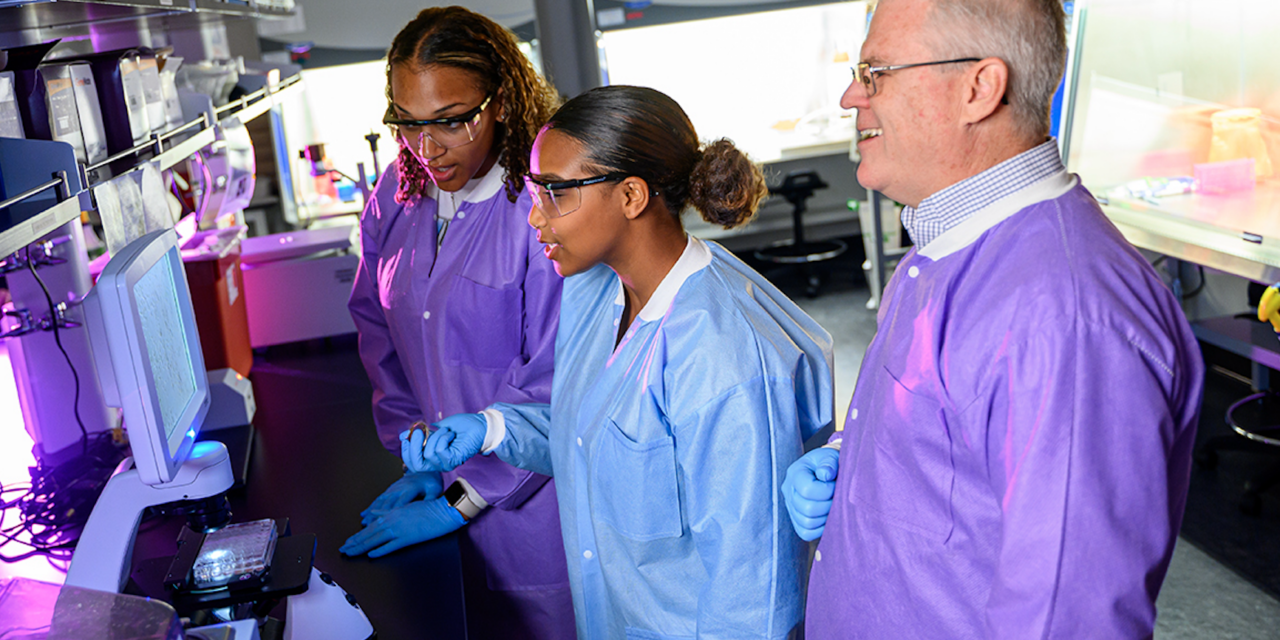A lot of college students across the country famously spend their summers partying and taking it easy.
However, High Point University students are known for using that time to give back to the community and continue their education.
This summer is no exception.
In fact, in the summer of 2023, students at the school are undertaking some very serious research – including projects analyzing cancer treatments and studying antibiotic resistant bacteria.
The High Point University campus has remained highly active, with students and faculty collaborating on a lot of innovative research. Students representing all academic schools are on campus participating in these programs that they applied for during the spring semester.
Here’s some of the work going on there right now:
- Using Virtual Reality to Make Public Service Announcements. Brian Heagney, the assistant professor of game design, is leading game design and media production students in a project that uses a virtual production studio at the Nido R. Qubein School of Communication to produce fire safety oriented Public Service Announcements for film and television.
Heagney and the students use a green screen, a virtual reality set and a desktop computer to create high-resolution virtual environments as backdrops.
Students Fighting Cancer. Dr. Robert Coover, assistant professor of basic pharmaceutical sciences at the university, is one of a group of professors and students in the Fred Wilson School of Pharmacy researching treatments for a type of deadly inherited cancer that often affects youngsters – who sometimes develop tumors in their nervous systems that can affect their ability to walk and move their arms or compress internal organs.
“We use a combination of techniques in our lab, from growing tumor cells and healthy cells, and testing compounds we make in-house to kill the tumor cells before we kill healthy cells,” Coover stated in a description of the process. “That is the goal of the entire cancer field. We’re making some good progress. Hopefully, we’ll move the needle with what we’re doing.”
The North Carolina Biotechnology Center recently funded that research.
Students Study MRSA Treatments. Dr. Heather Miller, associate professor of biochemistry, is working with three students with support of the nearly $440,000 National Institutes of Health grant on antibiotic resistant bacteria she received last year. The grant enables Miller to continue her research for three years and was the second of its kind awarded to HPU.
Tori Federico, a Communication and Business Leadership master’s student from Howell, New Jersey, has been working with Miller in the program since 2021. She said undergraduate research programs were the main reason she came to HPU.
“All of the state-of-the-art lab equipment we get to use and the great mentorship from Dr. Miller has been instrumental and inspired me to want to keep going with this, which is why even as a master’s student I am here this summer in the lab,” Federico said. “I intend to be here for the next two semesters because there is so much you learn about science research in general. MRSA research, particularly in respect to its antibiotic resistance, is so interesting because of the clinical relevance. It’s great to think that anything we’re working on in this lab could one day be used in clinical settings.”
Protein Survival. Dr. Kelsey Kean, assistant professor of biochemistry, is researching proteins from organisms that have evolved to survive in extreme conditions such as temperature, radiation and salt.
“Proteins are basically tiny machines inside every living organism that help us do everything,” Kean said. “They help us to see, breathe and digest our food. We’re interested in understanding how these tiny biological molecules can do so much impressive chemistry.”
Protecting Brain Cells. This is the research focus for Dr. Mike Grider, assistant professor of biology and interim director of the neuroscience program. He works with two students who use different treatments to lessen the effects of brain damage from certain events.
Testing Diabetes Treatments. Exercise science students and faculty are testing the effects of dietary metabolites and pharmaceuticals on muscle cells to study the effect of each using a cell model of diabetes. Dr. Roger Vaughan, associate professor in the Department of Exercise Science, is working with students to give muscle cells insulin resistance, which mimics type 2 diabetes.
Lindsey VanDerStad, a senior exercise science major from Waxhaw, North Carolina, said she learned new lab techniques and ways to analyze data by participating in this research.
“This project is interesting because it’s a very complex topic and there isn’t a lot known about it,” VanDerStad said. “This experience is helping to prepare me for my career by giving me hands-on experience in research. Evidence-based practice is important and being involved in this research has helped give me background to where the evidence comes from.”


Forget about cancer. According to Joe Biden, we’ve now cured that.